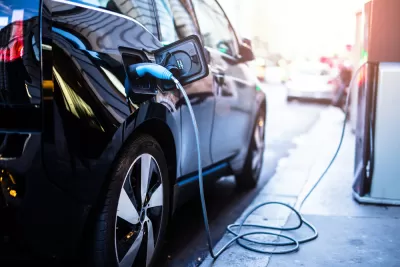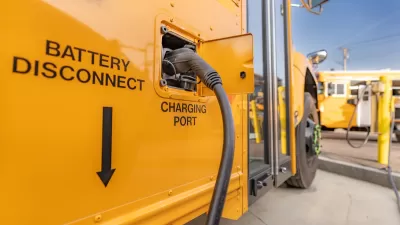A key question of the U.S. approach to greenhouse gas reductions is whether an already stressed electric grid will be able to handle a whole fleet of new electric vehicles.

Samantha Houston examines a key question in the wake of the Inflation Reduction Act’s focus on electric vehicles as a climate solution: Can the nation’s electric grid handle all the charging that will be necessary to keep the nation’s new fleet of electric vehicles running?
There are really two big questions in play, according to Houston: “Can the grid handle all of the electric vehicles (EVs) we have in the near term, like today and next year? And will the grid be able to handle all of the electric vehicles we will have as we progress toward a highly-electrified transportation future, by say 2040 or 2050?”
Electric grid woes have taken on a new political tenor in recent years, as heat waves and deep freezes have taxed energy grids around the country, sometimes with tragic results. Some critics worry that electric cars will add just another pressure on an already strained systems—reducing the resilience of energy systems and creating climate risks, rather than reducing them.
According to Houston, the grid is going to be just fine, in a direct rebuttal to the “fossil fuel disinformation machine.”
The grid is well-equipped to supply energy to EVs at current adoption levels. Over 2.7 million plug-in hybrid and full battery-electric cars and light trucks were sold in the United States by the end of 2021, with the majority of those still on the road. Sales of cars and light trucks in 2022 so far have been strong, with battery electric sales hitting a striking new record, and bus and heavy truck sales are expected to pick up as well. Even in states with higher EV adoption currently, power demand from EVs is not causing issues. For example, California has reach 16.3% light-duty EV sales (totaling 1.14 million EVs on the road), and while California has been struggling to maintain grid reliability the past few years, increased electricity demand from EV charging load is not one of the problems.
Upgrades will be necessary even in the short term, Houston admits, but there is enough capacity now to handle a wave of new electric cars. Even more upgrades and preparation will be necessary for the future, as well, but Houston offers a slate of recommendations for how to prepare for a future drive by electric vehicles.
FULL STORY: Can the Electric Grid Handle EV Charging?

Study: Maui’s Plan to Convert Vacation Rentals to Long-Term Housing Could Cause Nearly $1 Billion Economic Loss
The plan would reduce visitor accommodation by 25,% resulting in 1,900 jobs lost.

North Texas Transit Leaders Tout Benefits of TOD for Growing Region
At a summit focused on transit-oriented development, policymakers discussed how North Texas’ expanded light rail system can serve as a tool for economic growth.

Using Old Oil and Gas Wells for Green Energy Storage
Penn State researchers have found that repurposing abandoned oil and gas wells for geothermal-assisted compressed-air energy storage can boost efficiency, reduce environmental risks, and support clean energy and job transitions.

Planting Relief: Tackling Las Vegas Heat One Tree at a Time
Nevada Plants, a Las Vegas-based nonprofit, is combating the city’s extreme urban heat by giving away trees to residents in underserved neighborhoods, promoting shade, sustainability, and community health.

How Madison’s Tree Planting Efforts Are Growing a Healthier Community
Madison’s annual tree planting initiative is enhancing environmental resilience, public health, and community livability by adding 1,400 carefully selected trees citywide, with strong community and institutional support for urban forestry.

Texas State Bills Could Kill Transit Funding in Dallas, Austin
State lawmakers could pull funding from the state’s largest transit agency and the ambitious Project Connect, a voter-approved transit project in Austin.
Urban Design for Planners 1: Software Tools
This six-course series explores essential urban design concepts using open source software and equips planners with the tools they need to participate fully in the urban design process.
Planning for Universal Design
Learn the tools for implementing Universal Design in planning regulations.
Ascent Environmental
Borough of Carlisle
Institute for Housing and Urban Development Studies (IHS)
City of Grandview
Harvard GSD Executive Education
Toledo-Lucas County Plan Commissions
Salt Lake City
NYU Wagner Graduate School of Public Service





























